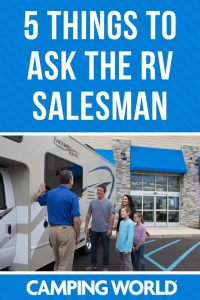Finding and buying your is an exciting—and sometimes overwhelming—experience.
You’ll find yourself on an RV lot with a couple hundred RVs. If you start your shopping journey online, you’re looking at tens of thousands of travel trailers, fifth wheels, and motorhomes—enough to make anyone’s head spin.
Your best bet is to find a knowledgeable RV Specialist to guide you through the process. We’ve got hundreds of them.
Here are 5 questions you need to ask your RV Salesperson while you’re finding your RV.
1. What RVs are Best for My Family’s Size?
This question will narrow the options considerably.
Are you a solo RVer? A smaller RV, easier to maneuver and set up by yourself, might be a good choice.
Are you a retired couple who sometimes wants to bring the grandchildren along? Maybe a Front-Living Travel Trailer with plenty of convertible sleeping areas in the main living area.
Large family with 3-4 kids? Try a fifth wheel with a separate bunk room to make sure you’ve got a little separation.
No matter your family’s composition, your RV Salesperson will be able to find some solid options for you.
2. What RVs are Best for Where and How I Want to RV?

RVing at campgrounds in the south is vastly different from boondocking in the Rocky Mountains.
It’s important to have a good idea of how you want to use your RV, then lean on your RV Salesperson to find RVs that will fit your usage.
If you’re primarily going to be at full-hookup campgrounds, there’s much less of a concern for water tank size. If you’re spending a lot of time in warmer climates, you’ll want upgraded Air Conditioning, but probably won’t need a four-season package.
RVing is all about tradeoffs, and your RV Salesperson can help you manage those choices and end up with the best RV for your plans.
3. What’s Included With My RV Purchase (and Warranty)?
Included options vary widely from manufacturer to manufacturer. You’ll want a comprehensive list of everything that’s included.
For example, some RVs include multiple Air Conditioning units, while some don’t include any. The same goes for awnings, slide toppers, power jacks, and more.
You’ll also want a deep understanding about what’s covered under your manufacturer’s warranty. Do they choose where the RV is serviced? Do they expect you to pay for service up from and reimburse you?
How long does the coverage last? If you feel like it’s insufficient, you can always add on an extended warranty plan.
4. What Financing Options do You Offer?
RV dealers typically offer a wide range of financing options. The volume at which they work with various banks give them access to finance programs and rates that individuals may not have.
While your bank may be able to finance an RV over a 5 or 7 year term, RV dealers can offer extended terms, sometimes up to 15 or 20 years. This brings the monthly cost of ownership down significantly, as does selling or trading in your current RV in the scenario you have one to sell.
Not only that, you’ll be able to fill out a single application and get a range of financing offers all at once.
5. What Service Support Can You Provide After the Sale?
Make no mistake—at some point after you buy your RV, you’ll need service.
No matter how thorough of a Pre-delivery Inspection an RV dealer completes, there’s no way to fully prep an RV for the shocks and vibrations of driving down the interstate for hundreds of miles.
You’ll want to ask your RV Salesperson what support they provide after the sale, and, more specifically, where they can provide service.
The last thing you want to happen is to be out on a trip and need service urgently, with your only options being an expensive tow back to the dealership at which you purchased or a non-covered repair at the local service shop.
Ideally, your dealer would be part of a large service network, where work can be done no matter where you’re traveling.
Your RV salesperson is an invaluable resource during your purchase process. Come prepped with the right questions and you’ll find the perfect RV, and RV dealership, for you!









